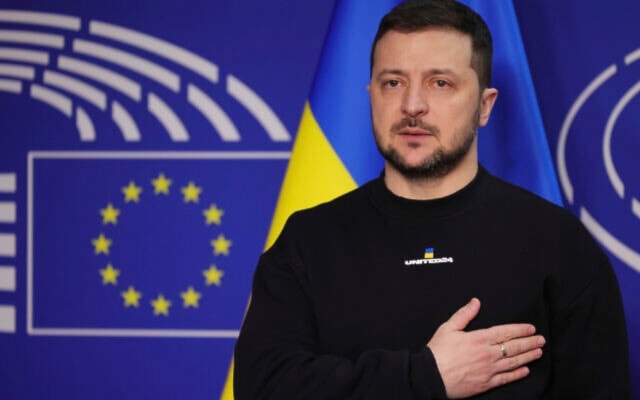Poll finds less than 10% of Europe believe in victory for Ukraine
The analysis, Wars and Elections: How European Leaders Can Maintain Public Support for Ukraine, discovered that just one in ten Europeans across the 12 nations polled felt Ukraine would win on the battlefield.
-

Ukraine’s President Volodymyr Zelensky poses for a picture before an EU summit at the European Parliament in Brussels, Belgium, February 9, 2023 (AP)
Over two years after the war in Ukraine began, only 10% of Europeans believe Ukraine can beat Russia, according to an EU-wide study, with a "compromise settlement" regarded as the most likely outcome.
This belief will necessitate a more "realistic" approach by politicians that focuses on defining what an acceptable peace genuinely means, according to the authors.
Co-author Mark Leonard of the European Council on Foreign Relations (ECFR), which commissioned the polling expressed that "EU leaders will need to change how they talk about the war."
Leonard detailed that Europeans did not want a Russian victory but with the belief that Kiev could not be successful, the more "convincing argument" for continued aid was that it could "lead to a sustainable, negotiated peace that favors Kiev."
The analysis, Wars, and Elections: How European Leaders Can Maintain Public Support for Ukraine, discovered that just one in ten Europeans across the 12 nations polled felt Ukraine would win on the battlefield, while twice as many (20%) projected a Russian triumph. Even in the most hopeful member nations questioned (Poland, Sweden, and Portugal), less than one in five (17%) felt Kiev could win.
Ukrainian President Volodymyr Zelensky revealed on Monday the difficulties his army is facing at the frontlines due to delays in military foreign aid and diminished morale following their defeat in Avdiivka.
The Ukrainian military is also grappling with severe deficits in their arsenal, specifically artillery, air defenses, and long-range weapons, that are not being balanced out due to the constant delay in the promised $60 billion military aid package by the United States.
The 'forever war'
According to the polls, the most prevalent belief in all nations, expressed by an average of 37% of respondents, was that the conflict will end in a compromise solution - but some countries were more optimistic about this outcome than others.
Sweden, Portugal, and Poland, all were more inclined to believe Europe should continue helping Ukraine, whereas Hungary, Greece, Italy, and Austria, a majority of those polled believed in pressuring Kiev to accept a compromise. In France, Germany, the Netherlands, and Spain, opinions were more equally distributed.
If the US suspends military aid to Ukraine under a Trump presidency, 41% of Europeans believe the EU should either raise or maintain its existing level of support, while 33% want the EU to follow the US approach.
The report’s authors reported that Europe is not in a "heroic mood" or showing optimism. Ivan Krastev, another co-author, warned the real danger was that Trump and Russian President Vladimir Putin, who has signaled that he is open to discussions will "try to portray Ukraine and its backers as the 'forever war' party."
In January, Bloomberg reported that Putin put forward signals to the United States through back channels that Moscow is open to discussing ending the war in Ukraine, including post-war arrangments for the neighboring country.

 3 Min Read
3 Min Read









